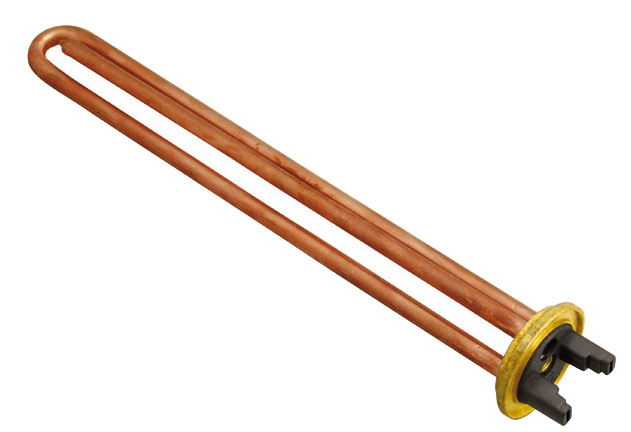Electric resistors for water heaters and the problem of system corrosion
Electric resistors for water heaters made of pure copper to limit the effects of corrosion

Electric resistors for water heaters induce vagrant currents into circuits which can favour spot corrosion. This damages the system components, starting from the electric resistors and ending with the boiler walls.
Sacrificial anodes of magnesium are usually installed to protect these components. The anodes, which can be easily replaced, corrode in place of the other components.
In heating systems, in fact, conditions exist that favour corrosion because of spurious currents. These conditions are tied, firstly, to the minerals present in the water which tend to favour electrolytic reactions. Indeed, the harder the water, the more this phenomenon intensifies. In an open circuit, like one for hot water, the phenomenon is difficult to control so softeners are usually placed at the water inflow points to prevent it.
Another two factors that greatly influence the situation are the water flow temperature and speed.
The electric resistors for water heaters in the catalogue are already prepared for the installation of these anodes. To limit their corrosion, instead, our electric resistors for water heaters are made of 99.9% pure copper.
Sacrificial anodes of magnesium are usually installed to protect these components. The anodes, which can be easily replaced, corrode in place of the other components.
In heating systems, in fact, conditions exist that favour corrosion because of spurious currents. These conditions are tied, firstly, to the minerals present in the water which tend to favour electrolytic reactions. Indeed, the harder the water, the more this phenomenon intensifies. In an open circuit, like one for hot water, the phenomenon is difficult to control so softeners are usually placed at the water inflow points to prevent it.
Another two factors that greatly influence the situation are the water flow temperature and speed.
The electric resistors for water heaters in the catalogue are already prepared for the installation of these anodes. To limit their corrosion, instead, our electric resistors for water heaters are made of 99.9% pure copper.
11/05/2017
I contenuti di questo sito non hanno carattere di periodicità e non rappresentano 'prodotto editoriale'.








